Unit6 Birdwatching grammar课件
文档属性
| 名称 | Unit6 Birdwatching grammar课件 | 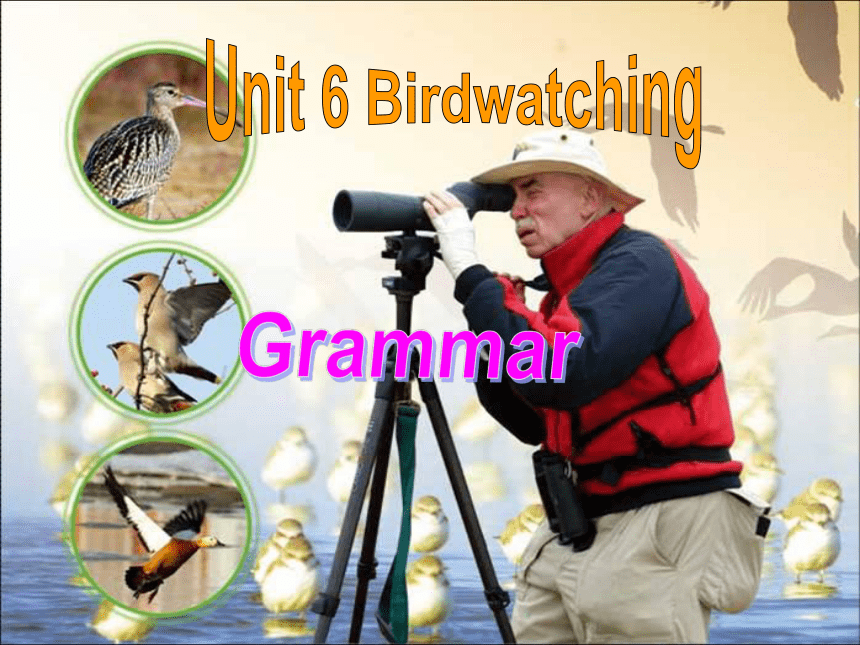 | |
| 格式 | zip | ||
| 文件大小 | 1.3MB | ||
| 资源类型 | 教案 | ||
| 版本资源 | 牛津译林版 | ||
| 科目 | 英语 | ||
| 更新时间 | 2014-11-22 03:35:45 | ||
图片预览

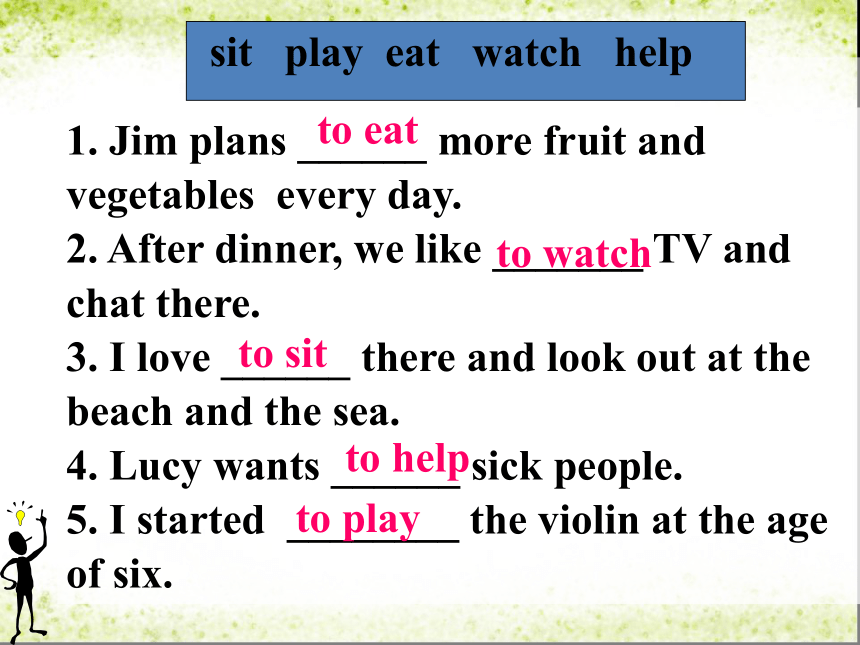
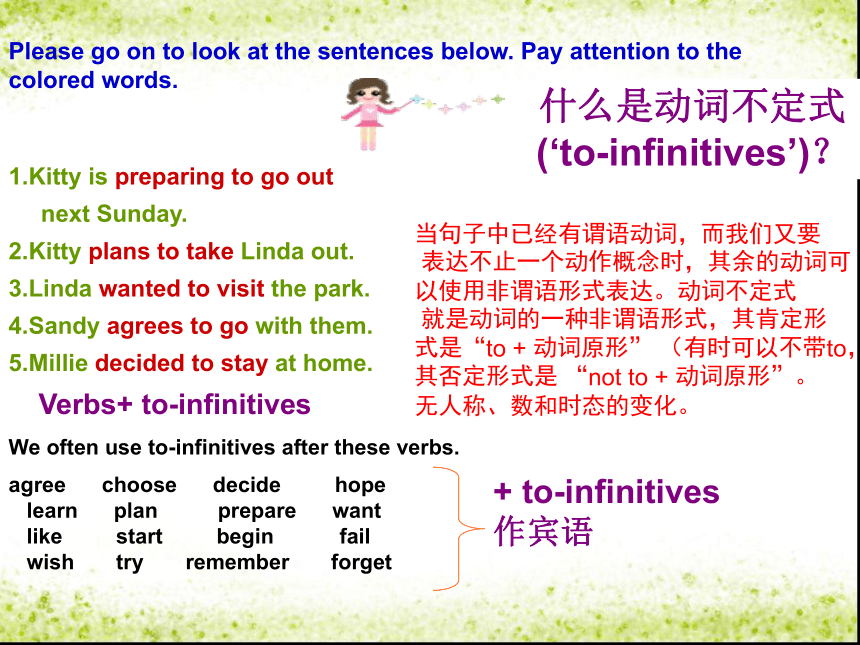
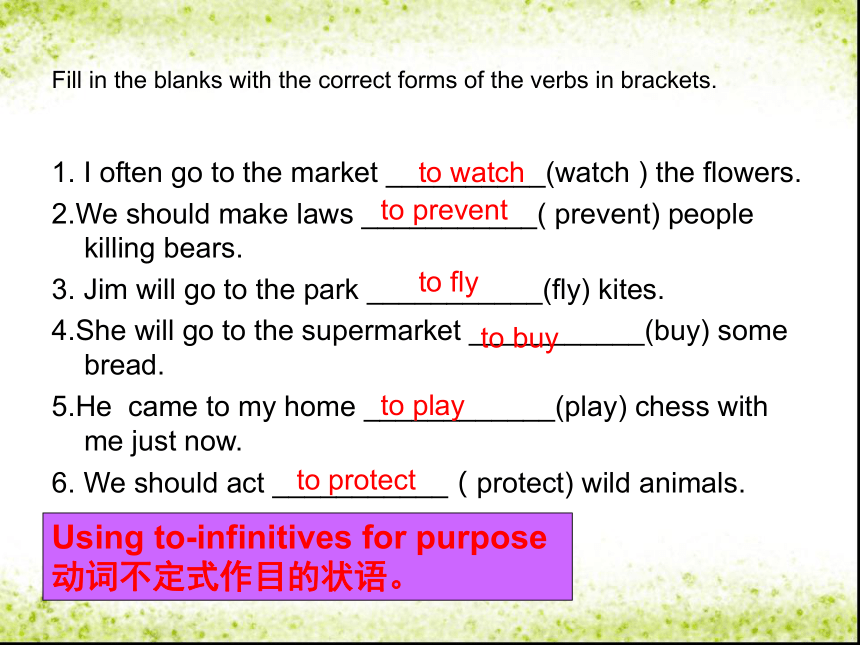
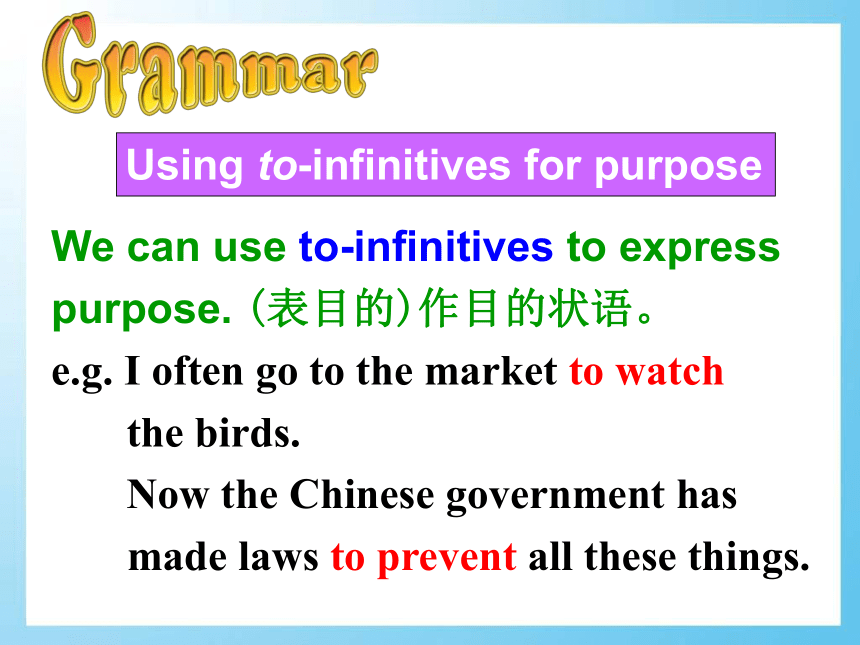
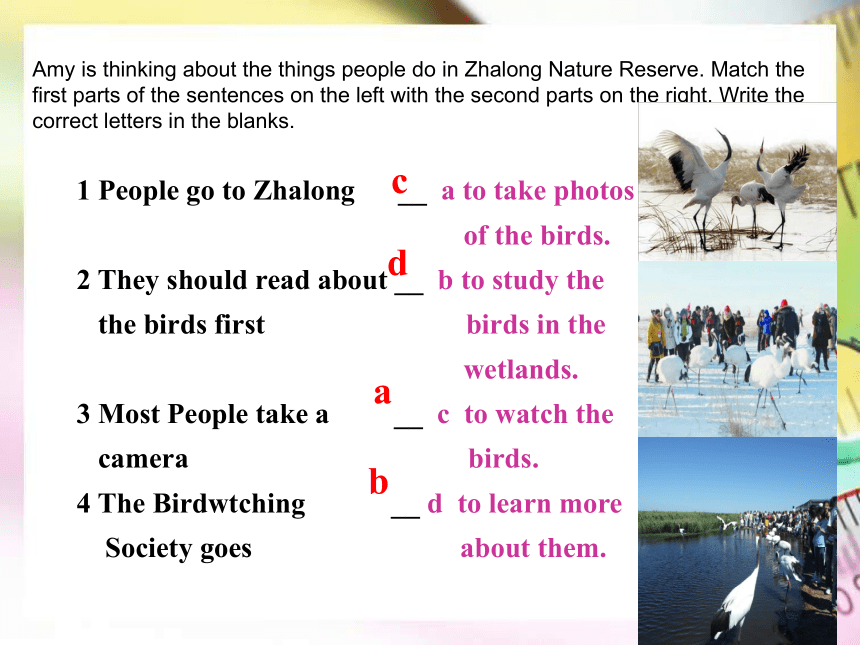
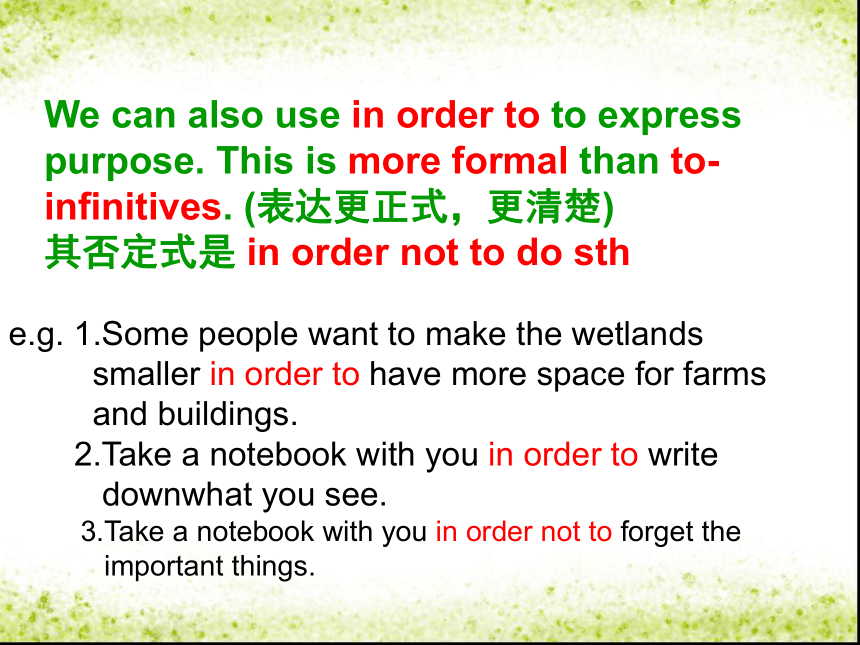
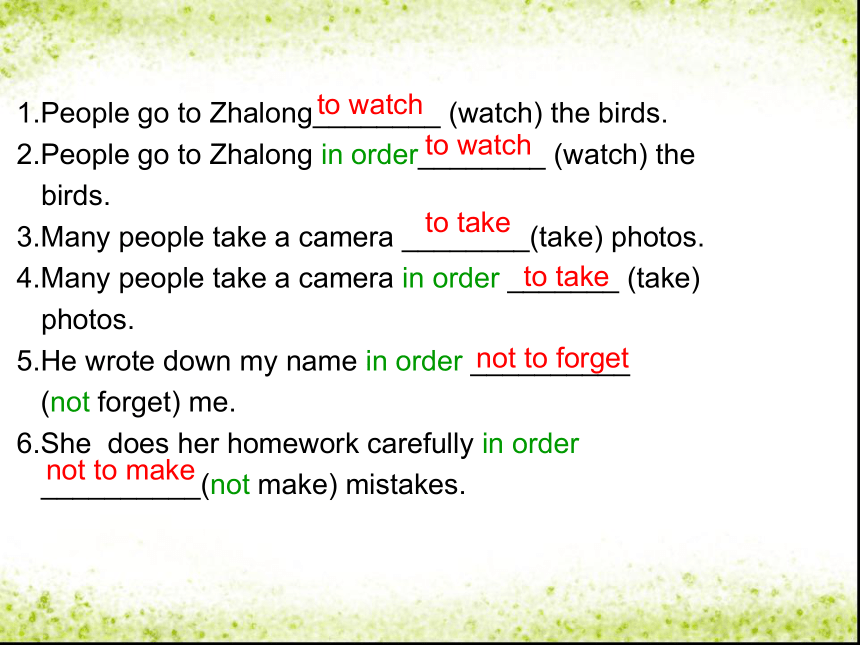
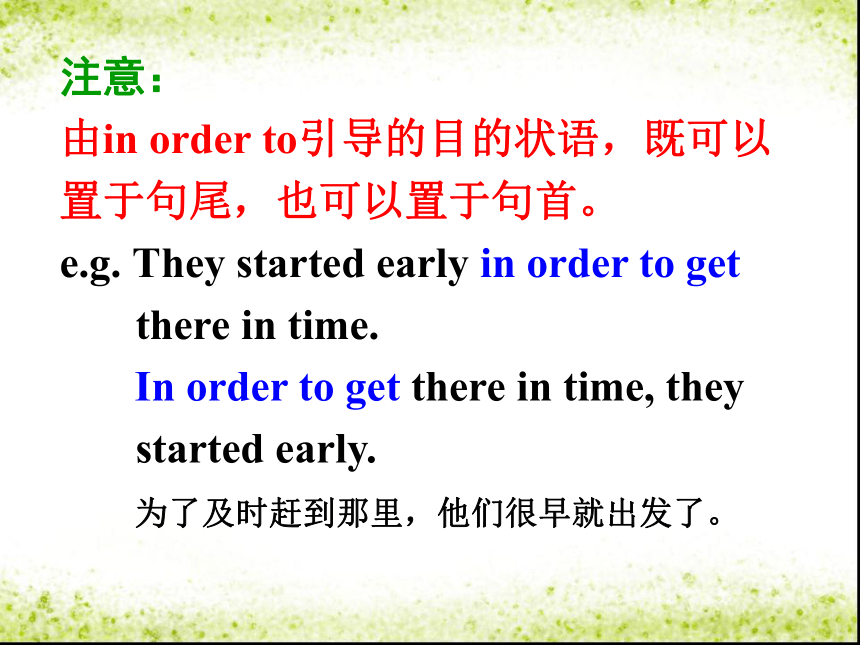
文档简介
课件20张PPT。Unit 6 BirdwatchingGrammar1. Jim plans ______ more fruit and vegetables every day.
2. After dinner, we like _______ TV and chat there.
3. I love ______ there and look out at the beach and the sea.
4. Lucy wants ______ sick people.
5. I started ________ the violin at the age of six. to eatto watchto sitto helpto playsit play eat watch help
Please go on to look at the sentences below. Pay attention to the colored words. 1.Kitty is preparing to go out next Sunday.
2.Kitty plans to take Linda out.
3.Linda wanted to visit the park.
4.Sandy agrees to go with them.
5.Millie decided to stay at home.什么是动词不定式
(‘to-infinitives’)?当句子中已经有谓语动词,而我们又要
表达不止一个动作概念时,其余的动词可以使用非谓语形式表达。动词不定式
就是动词的一种非谓语形式,其肯定形
式是“to + 动词原形” (有时可以不带to,其否定形式是 “not to + 动词原形”。
无人称、数和时态的变化。Verbs+ to-infinitivesagree choose decide hope
learn plan prepare want
like start begin fail
wish try remember forgetWe often use to-infinitives after these verbs.+ to-infinitives
作宾语Fill in the blanks with the correct forms of the verbs in brackets.1. I often go to the market __________(watch ) the flowers.
2.We should make laws ___________( prevent) people killing bears.
3. Jim will go to the park ___________(fly) kites.
4.She will go to the supermarket ___________(buy) some bread.
5.He came to my home ____________(play) chess with me just now.
6. We should act ___________(protect) wild animals.to watchto preventto flyto buyto playto protectUsing to-infinitives for purpose 动词不定式作目的状语。Using to-infinitives for purposeWe can use to-infinitives to express
purpose. (表目的)作目的状语。
e.g. I often go to the market to watch
the birds.
Now the Chinese government has
made laws to prevent all these things.1 People go to Zhalong __ a to take photos
of the birds.
2 They should read about __ b to study the
the birds first birds in the
wetlands.
3 Most People take a __ c to watch the
camera birds.
4 The Birdwtching __ d to learn more
Society goes about them.adbcAmy is thinking about the things people do in Zhalong Nature Reserve. Match the first parts of the sentences on the left with the second parts on the right. Write the correct letters in the blanks.We can also use in order to to express purpose. This is more formal than to-infinitives. (表达更正式,更清楚) 其否定式是 in order not to do sthe.g. 1.Some people want to make the wetlands
smaller in order to have more space for farms
and buildings.
2.Take a notebook with you in order to write
downwhat you see.
3.Take a notebook with you in order not to forget the
important things.
1.People go to Zhalong________ (watch) the birds.
2.People go to Zhalong in order________ (watch) the birds.
3.Many people take a camera ________(take) photos.
4.Many people take a camera in order _______ (take) photos.
5.He wrote down my name in order __________
(not forget) me.
6.She does her homework carefully in order __________(not make) mistakes.
to watchto watchto taketo takenot to forgetnot to make注意:
由in order to引导的目的状语,既可以
置于句尾,也可以置于句首。
e.g. They started early in order to get there in time.
In order to get there in time, they started early.
为了及时赶到那里,他们很早就出发了。Using verbs + objects + to-infinitivesWe can use some verbs with objects
and to-infinitives. (动词不定式在句中作宾语补足语)
e.g. We are now inviting them to help us.
We need more people to count and
describe the birds.We add not before to-infinitives to
express a negative meaning.
e.g. We ask people not to catch birds for
any reason.
He told me not to make much noise.常跟带to的动词不定式作宾语补足语的动词有:ask, tell, order, invite, get, allow, wish, want, encourage, advise, warn, would like, need, 等。动词不定式作宾语补足语,有带to和不带to的两种形式。e.g.
1.The policeman told the boys not to swim in the river.
2.The teacher asked the students to finish the homework on time.
3.Mr Wu advised us to read books aloud.make or let + object + infinitive without to
e.g. Max tells funny jokes and often
makes me laugh.
Mr Wu agreed to let me join their
school trip.常跟不带to的动词不定式
作宾语补足语的动词有:感官动词hear, feel, see, watch, notice等;使役动词let, make和have。see ,find, watch, feel, notice or hear + object + infinitive without to
e.g. 1.She saw a baby panda drink her mother’s milk.
2. Millie and Amy heard someone sing
in the park.
3. He always watch them play football.
注意:She saw a boy playing football on the ground
at this time yesterday. 表示动作正在发生。
动词help后面的动词不定式可带to, 也可不带to。help + object + infinitive with or without to
e.g. This will help people (to) understand
the importance of the wetlands.
She often helps me (to) do the
housework.The Class 1, Grade 8 students went to Zhalong Nature Reserve. Sandy is writing about their trip. Help her complete the sentences with the correct forms of the verbs in brackets. 1. Mr Wu _____ us ________ a pair of comfortable shoes because we would have to walk a long way. (ask/wear)
2. We _____ some birds _____ in the trees. (hear/sing)
3. Mr Wu _____ us _________ the birds carefully. (tell/watch)
4. He also __________ us __________ the birds. (encourage/describe)
5. He _______ us __________ in the wetlands. (advise/not shout)
6. The cold weather _______ some birds ______ south for the winter. (make/fly)
7. The trip _______ us ______ more about wildlife. (help/learn)
asked to wearheard singtold to watchencouraged to describeadvised not to shoutmade flyhelped ( to) learn1. 我父亲经常鼓励我努力学习。
My father often encourages me to study hard.
2. 去年李老师教我们打篮球。
Mr Li taught us to play basketball last year.
3. 语文老师让我们读这篇文章两遍。
The Chinese teacher made us read the article twice.
4. 为了通过期末考试, 我们必须更努力学习。
We must study harder in order to/ to pass the final exam.
In order to/ To pass the final exam, We must study harder .
ExercisesRecite the related phrases with to-infinitives.
Complete the rest of the exercises.Thank you
2. After dinner, we like _______ TV and chat there.
3. I love ______ there and look out at the beach and the sea.
4. Lucy wants ______ sick people.
5. I started ________ the violin at the age of six. to eatto watchto sitto helpto playsit play eat watch help
Please go on to look at the sentences below. Pay attention to the colored words. 1.Kitty is preparing to go out next Sunday.
2.Kitty plans to take Linda out.
3.Linda wanted to visit the park.
4.Sandy agrees to go with them.
5.Millie decided to stay at home.什么是动词不定式
(‘to-infinitives’)?当句子中已经有谓语动词,而我们又要
表达不止一个动作概念时,其余的动词可以使用非谓语形式表达。动词不定式
就是动词的一种非谓语形式,其肯定形
式是“to + 动词原形” (有时可以不带to,其否定形式是 “not to + 动词原形”。
无人称、数和时态的变化。Verbs+ to-infinitivesagree choose decide hope
learn plan prepare want
like start begin fail
wish try remember forgetWe often use to-infinitives after these verbs.+ to-infinitives
作宾语Fill in the blanks with the correct forms of the verbs in brackets.1. I often go to the market __________(watch ) the flowers.
2.We should make laws ___________( prevent) people killing bears.
3. Jim will go to the park ___________(fly) kites.
4.She will go to the supermarket ___________(buy) some bread.
5.He came to my home ____________(play) chess with me just now.
6. We should act ___________(protect) wild animals.to watchto preventto flyto buyto playto protectUsing to-infinitives for purpose 动词不定式作目的状语。Using to-infinitives for purposeWe can use to-infinitives to express
purpose. (表目的)作目的状语。
e.g. I often go to the market to watch
the birds.
Now the Chinese government has
made laws to prevent all these things.1 People go to Zhalong __ a to take photos
of the birds.
2 They should read about __ b to study the
the birds first birds in the
wetlands.
3 Most People take a __ c to watch the
camera birds.
4 The Birdwtching __ d to learn more
Society goes about them.adbcAmy is thinking about the things people do in Zhalong Nature Reserve. Match the first parts of the sentences on the left with the second parts on the right. Write the correct letters in the blanks.We can also use in order to to express purpose. This is more formal than to-infinitives. (表达更正式,更清楚) 其否定式是 in order not to do sthe.g. 1.Some people want to make the wetlands
smaller in order to have more space for farms
and buildings.
2.Take a notebook with you in order to write
downwhat you see.
3.Take a notebook with you in order not to forget the
important things.
1.People go to Zhalong________ (watch) the birds.
2.People go to Zhalong in order________ (watch) the birds.
3.Many people take a camera ________(take) photos.
4.Many people take a camera in order _______ (take) photos.
5.He wrote down my name in order __________
(not forget) me.
6.She does her homework carefully in order __________(not make) mistakes.
to watchto watchto taketo takenot to forgetnot to make注意:
由in order to引导的目的状语,既可以
置于句尾,也可以置于句首。
e.g. They started early in order to get there in time.
In order to get there in time, they started early.
为了及时赶到那里,他们很早就出发了。Using verbs + objects + to-infinitivesWe can use some verbs with objects
and to-infinitives. (动词不定式在句中作宾语补足语)
e.g. We are now inviting them to help us.
We need more people to count and
describe the birds.We add not before to-infinitives to
express a negative meaning.
e.g. We ask people not to catch birds for
any reason.
He told me not to make much noise.常跟带to的动词不定式作宾语补足语的动词有:ask, tell, order, invite, get, allow, wish, want, encourage, advise, warn, would like, need, 等。动词不定式作宾语补足语,有带to和不带to的两种形式。e.g.
1.The policeman told the boys not to swim in the river.
2.The teacher asked the students to finish the homework on time.
3.Mr Wu advised us to read books aloud.make or let + object + infinitive without to
e.g. Max tells funny jokes and often
makes me laugh.
Mr Wu agreed to let me join their
school trip.常跟不带to的动词不定式
作宾语补足语的动词有:感官动词hear, feel, see, watch, notice等;使役动词let, make和have。see ,find, watch, feel, notice or hear + object + infinitive without to
e.g. 1.She saw a baby panda drink her mother’s milk.
2. Millie and Amy heard someone sing
in the park.
3. He always watch them play football.
注意:She saw a boy playing football on the ground
at this time yesterday. 表示动作正在发生。
动词help后面的动词不定式可带to, 也可不带to。help + object + infinitive with or without to
e.g. This will help people (to) understand
the importance of the wetlands.
She often helps me (to) do the
housework.The Class 1, Grade 8 students went to Zhalong Nature Reserve. Sandy is writing about their trip. Help her complete the sentences with the correct forms of the verbs in brackets. 1. Mr Wu _____ us ________ a pair of comfortable shoes because we would have to walk a long way. (ask/wear)
2. We _____ some birds _____ in the trees. (hear/sing)
3. Mr Wu _____ us _________ the birds carefully. (tell/watch)
4. He also __________ us __________ the birds. (encourage/describe)
5. He _______ us __________ in the wetlands. (advise/not shout)
6. The cold weather _______ some birds ______ south for the winter. (make/fly)
7. The trip _______ us ______ more about wildlife. (help/learn)
asked to wearheard singtold to watchencouraged to describeadvised not to shoutmade flyhelped ( to) learn1. 我父亲经常鼓励我努力学习。
My father often encourages me to study hard.
2. 去年李老师教我们打篮球。
Mr Li taught us to play basketball last year.
3. 语文老师让我们读这篇文章两遍。
The Chinese teacher made us read the article twice.
4. 为了通过期末考试, 我们必须更努力学习。
We must study harder in order to/ to pass the final exam.
In order to/ To pass the final exam, We must study harder .
ExercisesRecite the related phrases with to-infinitives.
Complete the rest of the exercises.Thank you
